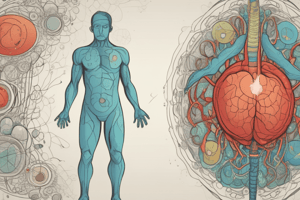Podcast
Questions and Answers
What is the most common type of hepatitis?
What is the most common type of hepatitis?
- Hepatitis C
- Hepatitis B
- Hepatitis E
- Hepatitis A (correct)
How is Hepatitis B typically transmitted?
How is Hepatitis B typically transmitted?
- Through contaminated food and water
- Through oral-anal sexual practices
- Through airborne transmission
- Through blood and blood products (correct)
What is the association between Hepatitis B and Hepatitis D?
What is the association between Hepatitis B and Hepatitis D?
- Hepatitis D requires Hepatitis B for replication (correct)
- Hepatitis D is a type of Hepatitis B
- Hepatitis B is a type of Hepatitis D
- Hepatitis B and Hepatitis D are unrelated
What percentage of post-transfusion hepatitis cases are attributed to HCV?
What percentage of post-transfusion hepatitis cases are attributed to HCV?
Why is Hepatitis B more severe than Hepatitis A?
Why is Hepatitis B more severe than Hepatitis A?
What is necessary for HDV to replicate?
What is necessary for HDV to replicate?
What is the typical mode of transmission for Hepatitis A?
What is the typical mode of transmission for Hepatitis A?
What is the former name of Hepatitis B?
What is the former name of Hepatitis B?
In which population is HEV more prevalent?
In which population is HEV more prevalent?
What is the purpose of immune globulin (IG) in hepatitis treatment?
What is the purpose of immune globulin (IG) in hepatitis treatment?
What is indicated by the presence of Anti-HBc in serum?
What is indicated by the presence of Anti-HBc in serum?
What is the primary purpose of liver biopsy in hepatitis diagnosis?
What is the primary purpose of liver biopsy in hepatitis diagnosis?
Flashcards are hidden until you start studying
Study Notes
Hepatitis
- Acute hepatitis is a liver infection that can be viral, drug-induced, or autoimmune in origin.
- There are five types of hepatitis: HAV, HBV, HCV, HDV, and HEV.
Types of Hepatitis
- HAV (Hepatitis A): most common type, transmitted via fecal-oral route, poor sanitation, contaminated food, water, milk, and shellfish, or oral-anal sexual practices.
- HBV (Hepatitis B): more severe, transmitted via blood and blood products, breaks in skin or mucous membranes, or from asymptomatic carriers with HBsAg.
- HCV (Hepatitis C): transmitted via intravenous drug use, sexual contact, blood or blood products, and from asymptomatic carriers, accounts for 90% of post-transfusion hepatitis.
- HDV (Hepatitis D): transmitted via same routes as HBV, requires HBV surface antigen to replicate, coexists with HBV.
- HEV (Hepatitis E): transmitted through food or water contamination, seen in developing countries, not encountered in the US.
Medical Care
- Laboratory tests: CBC, liver function studies, Anti-HAV IgM, hepatitis B surface antigen, hepatitis Be antigen, Anti-HBc, Anti-HBAg, urine bilirubin, prothrombin time.
- Liver biopsy: used to determine type of hepatitis and degree of liver necrosis.
- Liver scans: used to identify level of parenchymal damage.
- Treatment: symptomatic, prophylactic therapy, immune globulin (IG) for temporary passive immunity, hepatitis B vaccine for active immunity.
Pneumothorax
- Occurs when free air accumulates in the pleural cavity between the visceral and parietal areas, causing lung collapse.
- Pressure in the pleural space...
Studying That Suits You
Use AI to generate personalized quizzes and flashcards to suit your learning preferences.





